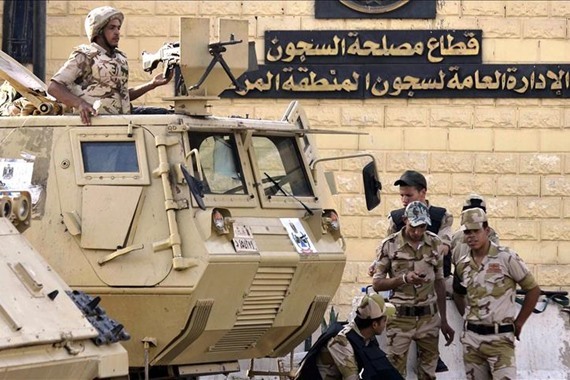From time to time, news leaks out about detainees in various Egyptian prisons starting open hunger strikes to obtain their rights and to protest their poor conditions and degrading treatment. Among prisons that witnessed hunger strikes is the highly-guarded and notorious Scorpion Prison, part of Tora Prison, where hunger strikes are frequent, amid deaths resulting from slow killing and deliberate medical negligence.
The hunger strike announcement comes via letters leaked from inside the prisons or through the detainees’ families, amid a media blackout and official silence. News websites have reported that hundreds of prisoners in Tora Istiqbal Prison began to protest against the ill-treatment they were subjected to during the past two weeks.
The inmates were stripped of their personal belongings, prohibited from exercise or using safe deposit boxes, the canteen and medical clinics. This comes in conjunction with the Ministry of Interior preventing visits as part of precautionary measures to confront the spread of the coronavirus, before it resumed them again on August 22, so that every prisoner has one visit per month.
Human rights sources confirmed that the percentage of prisoners participating in refraining from receiving prison food is about 70 per cent of the inmates. With the continuation of the search and stripping campaigns, the prisoners began to protest by chanting and knocking at the cell doors before the inmates of several wards escalated their protest by refraining from receiving food provided by the prison administration. The stripping of cells came after four police forces in Scorpion high-security prison, and four prisoners on the execution ward were killed on 23 September in mysterious circumstances.
Empty intestine
Last August, a letter attributed to prisoners in Scorpion Prison revealed that they had started a hunger strike since the sudden death of the Muslim Brotherhood leader, Dr. Essam el-Erian. The detainees on hunger strike demanded an independent investigation into el-Erian’s death, which they described as premeditated murder. In their message, the prisoners said that el-Erian has been in the Scorpion Cemetery for seven years, in solitary confinement without air and light. He was prevented him from receiving treatment and was deprived of his most basic human rights, which is the right to see his family. In July of last year, Amnesty International confirmed that nearly 130 people in Scorpion Prison in Cairo had gone on a hunger strike to protest their prison conditions.
The international organisation called on the Egyptian authorities to immediately end the cruel and inhuman detention conditions in the high-security Scorpion Prison and allow prisoners’ families visits. It is noteworthy that there are thousands of political detainees in Egyptian prisons since the military coup in 2013, some of them were sentenced to politicised rulings for opposing the coup, and most of them were renewed in pretrial detention. From a legal standpoint, a hunger strike is seen as a form of peaceful resistance. Many human rights defenders at the international level see it as one of their guaranteed rights of expression.
Limited success
For his part, Mahmoud Kebish, Dean of the Faculty of Law at Cairo University, believes that a hunger strike is a human right, yet it appears that the practices of the Egyptian state on the ground contradict this right. Prison regulations have vaguely worded permission for doctors to take all necessary measures to preserve a prisoner’s health. Prisons have often resorted to controversial practices such as force feeding to end the hunger strike, and Kabish also notes in his speech that in the event of the death of a prisoner on hunger strike, the cause of death is recorded as suicide.
The 2014 hunger strike dubbed the battle of the empty stomachs achieved limited success in some cases, as former Al Jazeera journalist Abdullah al-Shami was released after months of intense campaigning on social networks. Al-Shami was released on June 17, 2014, after he was held for 306 days without charge, including 147 days on hunger strike, as he lost more than 40 kilograms of weight and suffered a severe deterioration of vital functions. Among the most famous battles of the empty stomachs is the strike of Muhammad Salah Soltan, which eventually forced the authorities to extradite him to the United States.





Recent Comments